The Resurrection and Collapse of Empire in Habsburg Serbia, 1914–1918
Volume 1
$41.99 (C)
Part of Cambridge Military Histories
- Author: Jonathan E. Gumz, United States Military Academy
- Date Published: February 2014
- availability: Available
- format: Paperback
- isbn: 9781107689725
$
41.99
(C)
Paperback
Other available formats:
Hardback
Looking for an examination copy?
This title is not currently available for examination. However, if you are interested in the title for your course we can consider offering an examination copy. To register your interest please contact [email protected] providing details of the course you are teaching.
-
This book examines the Habsburg Army’s occupation of Serbia from 1914 through 1918. This occupation ran along a distinctly European-centered trajectory radically different from other great power colonial projects or occupations during the 20th century. Unlike these projects and occupations, the Habsburg Army sought to denationalize and depoliticize Serbia, to gradually reduce the occupation’s violence, and to fully integrate the country into the Empire. These aims stemmed from 19th-century conservative and monarchical convictions that compelled the Army to operate under broad legal and civilizational constraints. Gumz’s research provides a counterpoint to interpretations of the First World War that emphasize the centrality of racially inflected, Darwinist worldviews in the war.
Read more- Creates a new trajectory of the history of occupation in the 20th century
- Extensive archival research sheds light on the collapse of the Habsburg Empire
- Approaches occupation from a broad perspective and breaks down barriers between military, cultural, social, political, and legal history
Reviews & endorsements
“This book effectively refutes the argument that Austria-Hungary’s occupation of Serbia constituted an unrestrained war of national destruction. It also challenges recent scholarship that views wartime occupation practices in Eastern Europe through a lens of colonization that anticipated Nazi atrocities in the Second World War. Jonathan Gumz argues that unlike many of their peers elsewhere in Europe, Austria-Hungary’s conservative military leaders in fact rejected total war policies that merged war and home fronts. Gumz clearly elaborates this traditional military culture, demonstrating its workings at both the casual village level in occupied Serbia and in the highest Imperial councils in Vienna. He elucidates the key conflicts that set the military against the imperial bureaucracies during the War, and that by 1918 had helped to destroy the regime’s legitimacy among its citizens. Above all, his comparative approach produces important insights onto wartime practices, not only in Austria-Hungary but throughout Europe. This is military history at its best, broadly conceived, clearly applicable beyond specifically military situations, and above all, superbly grounded in archival research.” -Pieter Judson, Swarthmore College
See more reviews“Gumz challenges orthodoxies on the Austro-Hungarian occupation of Serbia by describing an evolution from brutality to a pragmatic symbiosis. By 1917 Serbia developed into a vital source of food purchased on such advantageous terms that consideration developed of extending postwar Habsburg rule over a Serbia not merely pacified , but content. Was this an anomaly? Or is it time for a fresh perspective on occupation during the Great War?” -Dennis Showalter, Colorado College
“This brilliant account of the Austrian war against Serbia between 1914 and 1918 fills a huge gap in our understanding of the way the Great War reconfigured the boundaries between front, home front and occupation. Gumz shows authoritatively how the Austrian army marched through Serbia right back into the nineteenth century, by trying to do the impossible: to separate battle front and home front in the midst of total war. Their failure to do so is at the core of the failure of the Habsburg empire to survive the war.” -Jay Winter, Yale University
"Gumz has broken much new ground here, and both casual students and serious scholars of the war will find much here to pique their interest."
German Studies Review, Richard L. DiNardo, USMC Command and Staff CollegeCustomer reviews
17th Oct 2024 by UName-739648
Highly valuable English-language study of the Habsburg army's Military culture and practices during the Balkan Campaign. This can be compared to Isabel Hull's book "Absolute Destruction" on Imperial German & Prussian military culture. It contains important critiques on modern scholarship and is extremely useful in understanding the bridge between 19th century modes of warfare vs. the modernised form of total war that was WWI.
Review was not posted due to profanity
×Product details
- Date Published: February 2014
- format: Paperback
- isbn: 9781107689725
- length: 288 pages
- dimensions: 229 x 152 x 17 mm
- weight: 0.43kg
- contains: 9 b/w illus.
- availability: Available
Table of Contents
1. The summer of 1914: the Hapsburg empire meets Serbian warfare
2. Eradicating national politics in occupied Serbia
3. Legal severity, international law, and the tottering empire in occupied Serbia
4. Food as salvation: food supply, the monarchy, and Serbia, 1916–18
5. A levee en masse nation no more? Guerilla war in Hapsburg Serbia.
Sorry, this resource is locked
Please register or sign in to request access. If you are having problems accessing these resources please email [email protected]
Register Sign in» Proceed
You are now leaving the Cambridge University Press website. Your eBook purchase and download will be completed by our partner www.ebooks.com. Please see the permission section of the www.ebooks.com catalogue page for details of the print & copy limits on our eBooks.
Continue ×Are you sure you want to delete your account?
This cannot be undone.
Thank you for your feedback which will help us improve our service.
If you requested a response, we will make sure to get back to you shortly.
×
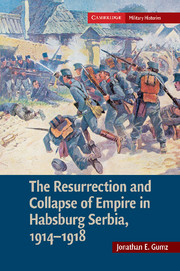

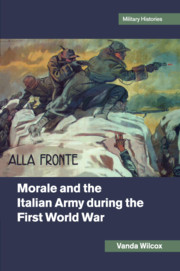

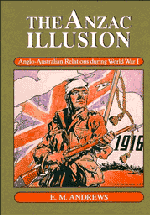
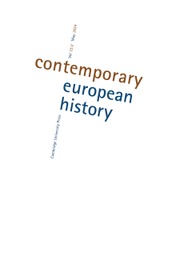
.jpg)
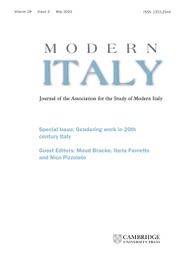
.jpg)